Biotechnology applied to the vermiculture in farms' Projects - SteemChurch
Dear Friends,
To build and maintain an organised community it is necessary to have dedication, to show perseverance, to make firm decisions and especially to express passion for the community. Additionally one should develop programs, plans, projects and achieve proposed goals. However, these factors do not cover the characteristics and challenges that creators and co-organizers of the communities SteemStem, SteemChurch have to face. Aware of this administrative logistics network that lies mainly in leaders, curators and collaborators, I share some knowledge from my research and experience as result of my enthusiasm for best ecological practices, which would be useful to beneficiaries of the farm's project of the first Blockchain Church that promotes the food production through sustainable development.
This post is an improved version of the original posted in Spanish language. I invite you to know my ecological experience.
Production of vermiculture
One of the main aspects of the Sumerian's Evolution was the agriculture, this sedentary population was a pioneer in the practice of biological's indicators through the observation of the macro fauna and the quality of the soil to produce their food. More than 5,000 years ago, they discovered what we called today biotechnology, they showed interest in this and realised how important were the worms in the process of planting and development of productive crops.
Among of many technological advances it is the fascinating delimitation of an area, removal of the superficial layer and estimation of the population of earthworms.
Biblical and scientifically it is known that Nile Delta soil is positioned among the most fertile soil in the world. On the margins of this giantess River flows with abundance many food which are product of the agriculture. During the Egyptian Dynasty (Pharaohs) and Cleopatra's Monarchy the earthworms enjoyed of imperial protection and they were considered to be sacred animals and responsible of the majestic fertility and prosperity of agricultural soil, so people who were found guilty of causing damage or trying to remove these species from their habitat they were punished severely and even they received a capital punishment.
Moreover, the naturalist and Greek philosopher Aristotle through his ingenious deductive method catalogued them as the intestines of the land due to its great property of humidification to make productive the cultivated areas. However, it would be Sir Gilbert White (1775), who wrote the book The worm as promoter of vegetation, this book was read by Charles Darwin during his childhood, it captivated him so much that he became in the first scientific to put in practice the vermiculture in the world. This remarkable researcher would devote the rest of his life to the study of these annelids and other species, highlighting as part of his work the publication The production of topsoil with earthworms. His book continues being a source of consultations by scholars and producers.
Process of vermiculture
The best definition of this process derived from the analysis and significance of the content set out in the preceding paragraphs and it is complemented by a specific explanation of the use of energy and its transformation during journey through the different stations of the food chain; Please look at this in a pedagogical manner. The main source of energy is the sun, plants and the vast majority of organisms producing oxygen known as producers. Thus they generate their own food (autotrophs) and usually they are the food in the diet of consumers (heterotrophs) animals that get their energy and at the same time are prey for predators (carnivores).
So far we could understand that the producers have the function of providing energy to the consumers , who take advantage of it and they transform part of it. It is necessary another trophic level, so the nature is able to transform the energy and the biomass could continue its journey.
Processed by the fetid Eisenia substrate
A recovery activity is required for the degradation of the matter and the cyclic route continuity, it is here where the worm plays a fundamental role, it lies between the decomposers - detritivores, they handle the processing of all dead organic matter; for example, a plastic waste crusher makes a grinding activity and decreases the size of objects, thus they are passed by another Pelletizer that practically leaves them with less grain. The worms do the same thing, eat vegetable debris, animals and minerals (Earth) to facilitate the work of the soil microfauna (fungi, bacteria and protozoa).
During this complex system it intervenes a stage of bio-oxidation with interesting chemical reactions that show gradual during the process of degradation where detritivores decomposers - obtain energy of the substrate and increase their biomass through the action of recycling resulting in a final product with a stabilised, enriched and homogenised substance that vitalise the soils with high supply of nutrients; This is called vermiculture, compost worms, humus, compost or lumbricompost.
Species involved in the process
There are different species of worms involved in the vermiculture process and they are able to ingest daily quantities of waste equivalent to its own weight, of course, depending on the type of organic matter and earthworm species. However in order to complete the entire process is required teamwork with roles and different responsibilities, something similar to what I explained in the introduction of this post, when I refer to the contribution and teamwork to build SteemShurch with everyone's help. Well, organic matter on the journey through the digestive system of earthworms it suffers an alteration of their chemical composition and it is excreted with a high concentration of nutrients that stimulates the presence of micro-organisms that are responsible for continuing the matter's bio-degradation.
Similarly, earthworms in their permanent journey and mobility in the substrate are primarily responsible for the aeration system that enhances the microbial bio-oxidation. This synchronised work between earthworms, microorganisms and associated fauna it makes possible to enrich the substrate by their mineralogical, humidifying and stabilising contribution.
Worms
Only 6 out of more than 4000 known species of earthworms have demonstrated the ability to degrade organic solid waste, resulting in the consumption of high volume of organic matter and substrate. They have been using Eisenia andrei and fetid Eisenia because its large capacity to biodegrade.
For practical purposes of this article, I have worked with fetid Eisenia, whose characteristics feature an average body length of 60/120 mm with diameter of 3.5-6 mm. Depending on some environmental factors the number of segments (rings) varies between 80 mm and 120mm. In favourable conditions they can have a 15 year life cycle . Another special trait is that they are hermaphrodites and their mating occurs mostly when they rise to the surface in search of food. The end product of the mating are cocoon capsules taking approximately 7 days to hatch, however this could change depending on the various conditions and environmental factors (taking between 14-21 days ).After this period of time these specimens are fully self sustainable as they have mobility and ability to feed immediately.
Microorganisms
In vermiculture processes occurs a synchronised and effectively teamwork, there are many related microorganisms, mainly bacteria, fungi and Actinomycetes Mesophiles. The work of earthworms and microorganisms are intimately linked, because microorganisms are part of the diet of worms, however worms are more interested in bacteria, algae, fungi and some protozoans.
On other hand earthworms degrade the physical structure of the waste, transforming them through their digesting process, one worm will be able to swallow a mass equivalent to their body weight and it will fragment this , generating organic matter and increasing its surface resulting in an immediate effect on the function of the microorganisms present.
Associated fauna
Due to ecosystem characteristics and factors of the transformation of organic matter, there are many organisms keen to participate in this process without being invited. These organisms inhabit the substrate that feed them on organic matter , or it could be used as a place of refuge from predators or hydroclimatic conditions . Under certain conditions the substrate can be the perfect habitat for detritivore such as scale insects and beetles , which causes some competition with earthworms for food.
Depending on the control of the edagifa fauna, the same conditions and ecological factors there are other invertebrates that contribute to the decomposition of the organic substrate such as nematodes, mites and insects detritofagos who share the abundant feast of organic matter with the worms without causing any prejudice or ecological imbalance.
To ensure that this process is carried out with a proper balanced ecological chain it is required to look after of the process and the preservation of conditions in controlled environments.
Ecobiotechnological process of the fetid Eisenia and microorganisms
Nature and characteristics of organic waste
Due to the same productive action of food to meet basic needs for human and animal population, it is generated a large amount of sub products, waste and residues which have been tested and submitted to trials obtaining optimal results from experiences of vermiculture . They need to comply with biological, physical and chemical aspects.
Humidity
The organic waste or residues and substrate that conform the bedding should have a humidity above 55% and not greater than 85%, this last being the most favorable and where it has obtained better performance, given that earthworms have a respiratory system that is activated by the humidity through a gas exchange which takes place by their skin when this is in contact with a humid environment.
In the meantime, it is important to adjust the humidity to the recommended parameters establishing a control over this physical factor that directly affects the biological and physiological process of the fetid Eisenia.
Aeration
The structure and composition of the substrate must ensure a porosity that allows the easy movement of the worms and other edagica wildlife for adequate ventilation and oxygenation.This factor is linked to the humidity and one must follow the technical instructions to not saturate the substrate of water, depleting the oxygen and subsequently generating the compaction in localized areas. Therefore the importance of maintaining a soft and light texture (not heavy) to allow quantities of oxygen between 55% and 65%.
Population density
Population density may compromise the normal development of the vermiculture process, a high number of species would cause a fierce fight between the organisms causing delays in the process and generating losses. It is important to describe that in natural conditions, colonisation is balanced directly by physical factors and the availability of food and that the resulting biomass is low to moderate. However, in controlled environments earthworms have shown better performance for the abundant demand of food and techniques to control the ecological conditions in the community.
PH
This parameter high or low in the waste (food) can affect the production process because the worms have a range of PH tolerance. Testing and analysis of the organic matter and substrate have demonstrated that earthworms and specifically the fetid Eisenia develops and reproduces with more effectiveness when PH parameters oscillate between 5 and 9, preferring a neutral PH (food).
The invasive fauna that put in risk the earthworms
Up to here all parameters described are related to each other, this is no an exception. In controlled environments not only the mishandling of the man (by ignorance) represents a danger to earthworms. Exist as well another enemies that compromise the ecosystem and the process of vermiculture such as ants, palletized, mites, centipedes, beetles, and others. They could colonize and cause serious damage. The best way to control these predators is keeping parameters PH and humidity above 80% and 7 respectively, as they do not tolerate such conditions in the substrate.

Preliminary conclusions
Below some preliminary considerations, leaving the final provisions of the following chapter develops the follow-up process for the production of vermiculture.
- Vermiculture is a technique that has been evolving through several tests and results that allow sowing and reproduction of worms in controlled environments for the production of solid and liquid humus (humic acid), fertilised substances that contain a high load of nutrients and microbial components which are more efficient, effective and not harmful as conventional fertilizers.
- The lack of knowledge on the behavior, reproduction of the fetid Eisenia and soil microfauna that intervenes in the process of vermicomposting could generate a low production or a total loss of ecobiotecnologica activity.
- The overpopulation of the fetid Eisenia causes imbalance in artificial ecosystems and negatively affects the production of vermiculture.
- Keeping an adequate control of the physical and biological factors of the waste and organic matter could guarantee a ecosystem free of predators and harmful wildlife , because it is most likely they will not tolerate PH and humidity conditions that are tolerated by the fetid Eisenia and others microbial organisms and fungi contained in the substrate.
Materials
Multiple module of plastic and metal beds
Containers of 18.75 l and 3.75 l
Shovel
4 meters of land with moderate organic content
Chicken manure and manure of cattle.
Vegetable organic domestic waste.
Vegetable ash
Water
Milk serum
Digital equipment and software
Wireless equipment Alcatel pop + 4 digital camera: the photographs belong to the blog of the author.
Program photoshop cs6
Mindjet MindManager 2018 program
Microsoft Office Picture Manager
Bibliographic references
Cara, G. and Riviera, J., (1998). Residuos en la agricultura intensiva: El caso de Almería. In: Encuentro Medioambiental Almeriense: En busca de soluciones., Universidad de Almería.
Domínguez, J., Parmelee, R.W., Edwards, C.A. (2003). Interactions between Eisenia andrei (Oligochaeta) and nematode populations during vermicomposting. Pedobiol. 47:53-60.
Nogales, R., Benítez, E., Elvira, C., Gallardo-Lara, F., (1995). Uso agrícola de compost y vermicompot de basuras urbanas I: Procesos, madurez y calidad de los productos.
Organización de las Naciones Unidas para la Alimentación y la Agricultura (2013). Manual de compostaje del agricultor. Experiencias en América Latina. Oficina Regional para América Latina y el Caribe. Enlace
SteemSTEM support by voting as a witness here



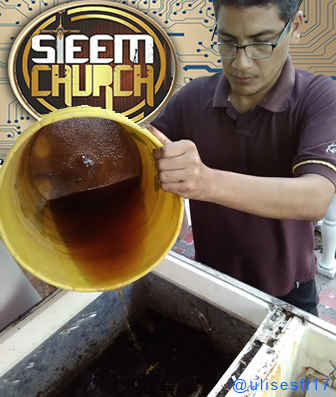
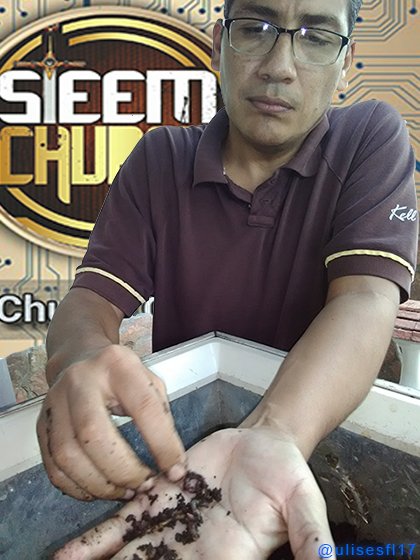
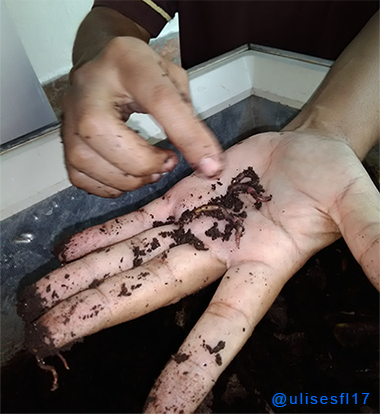
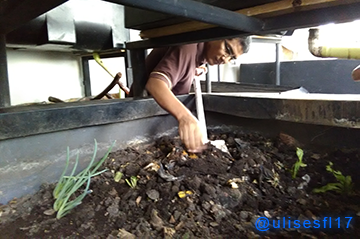
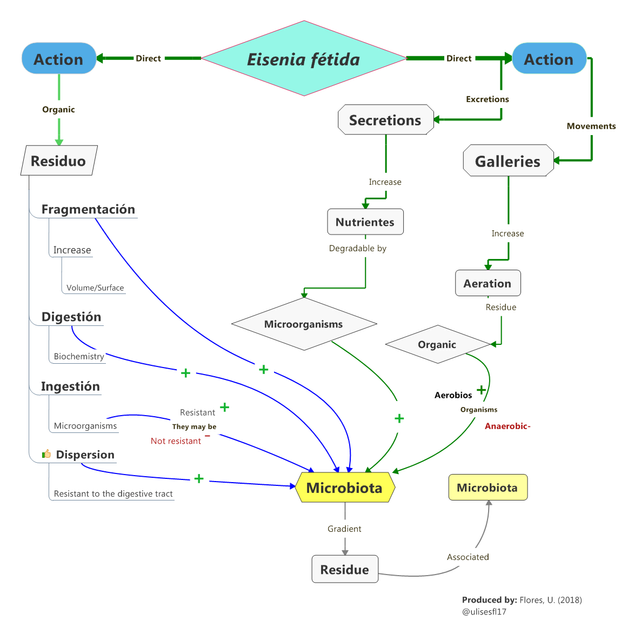
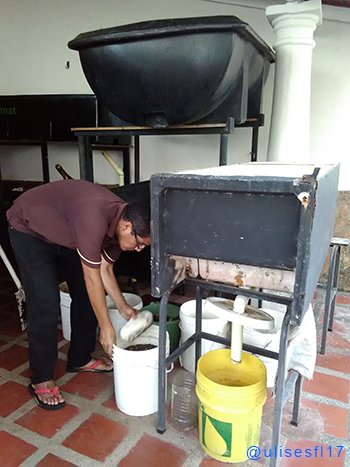
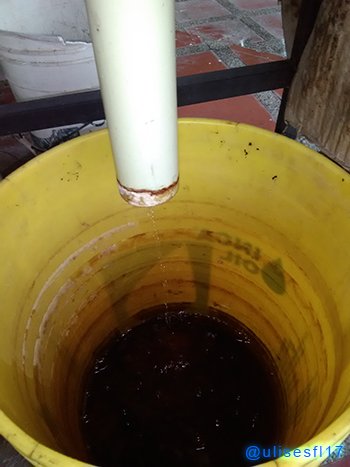
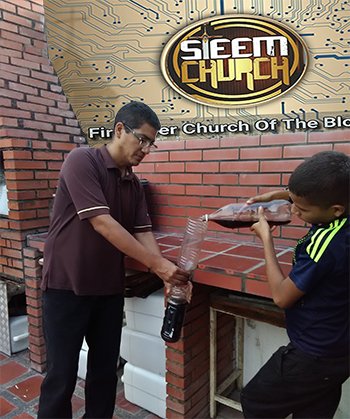
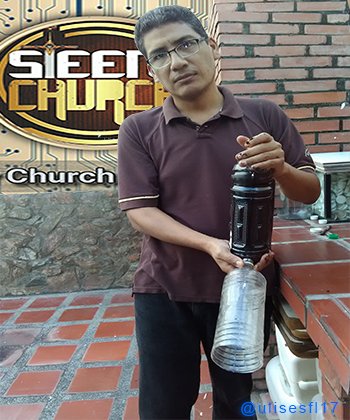
Hi @ulisesfl17!
At SteemChurch we are pleased to find on our label a publication full of expectation, vision and a lot of talent. We are eager to carry out this project that will bring productive awareness to the community in general!
Nowadays the price of conventional fertilizers surpasses the economic expectations of the farmers; On the other hand, it has become an absolute challenge to find this type of product in the agricultural market. Undertakings of this type contribute a lot to the wonderful project Farms - SteemChurch.
This server is eager to get more involved in the Farms - SteemChurch project.
Grateful for his valuable recognition and comment ... Blessings
We @farms finds this detailed post of great agricultural benefits to this community and we encourage original content and author...... thanks for sharing this post with us
Resteem
Amazing @ ulisesfl17, incredible talent and above all passion for your vocation. Thank you for your strategies to make a chain of production, with tools from the same organisms of nature, in fact, in our church we are proud to carry out this project with you. Success and long life @ulisesfl17
Amen. Thank you for your valuable contribution and comment.
Blessings Brother @emiliocabrera
What an interesting project it is very news to tell in SteemChurch, with people prepared and with initiatives like you @ulisesfl17 to work in this crusade for freedom.
Amen. That's right, to build community by developing our gifts and talents to promote a true sustainable development that allows us to produce more food.
Blessings @lorennys
These are interesting I hope to learn and participate greetings and blessings @ulisesfl17.
Thank you for your attention and blessings. It is great to be able to count on talented people who want to exchange knowledge and experiences to build community led by @SirkNigth.
Regards
I had heard of this but I had not really paid attention but it should be interesting to turn the remains of food and vegetables into natural fertilizer as this will bring great savings, good initiative @ulisesfl17.
Hello, @tnrb. In fact, it is an excellent alternative because in addition to minimizing costs for the purchase of fertilizers, an ecological product is used and it contributes to the reduction of organic waste that is an environmental problem throughout the world.
Thank you for reading my post and supporting the ecological initiative. Blessings
Congratulations! This post has been upvoted from the communal account, @minnowsupport, by Ulisesfl17 from the Minnow Support Project. It's a witness project run by aggroed, ausbitbank, teamsteem, someguy123, neoxian, followbtcnews, and netuoso. The goal is to help Steemit grow by supporting Minnows. Please find us at the Peace, Abundance, and Liberty Network (PALnet) Discord Channel. It's a completely public and open space to all members of the Steemit community who voluntarily choose to be there.
If you would like to delegate to the Minnow Support Project you can do so by clicking on the following links: 50SP, 100SP, 250SP, 500SP, 1000SP, 5000SP.
Be sure to leave at least 50SP undelegated on your account.